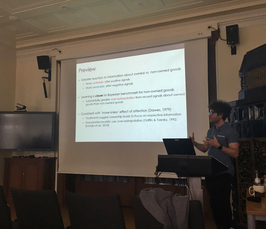Ownership, Learning and Beliefs
- Date: Jul 11, 2019
- Time: 11:00 AM (Local Time Germany)
- Speaker: Alex Imas
- Carnegie Mellon University
- Location: MPI
- Room: Ground Floor

We examine how owning a good affects learning and beliefs about its underlying value. Several behavioral anomalies are associated with ownership, such as the endowment and disposition effect, but they focus largely on biases in preferences. In a series of studies designed to control for a host of confounding factors, we demonstrate that ownership impacts learning and beliefs. After receiving a positive or negative signal about a good's underlying value, ownership leads people to become more optimistic or pessimistic about the value, respectively, compared to receiving the same signal about a good that is not owned. People overreact to signals about goods that they own relative to normative benchmarks, but learning is close to Bayesian for goods that people do not own. In exploring the mechanism for this effect, we find evidence that ownership leads individuals to pay more attention to goods that are owned and overweight the informativeness of recent signals. We demonstrate a similar relationship between ownership and over-extrapolation in survey data about stock market expectations. Our findings provide a microfoundation for models of disagreement that generate trade in asset markets, have significant implications for the measurement of psychological frictions from behavioral data and are relevant to any economic application involving ownership and learning.